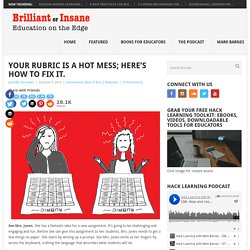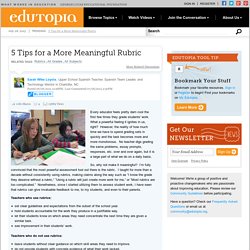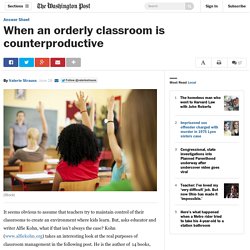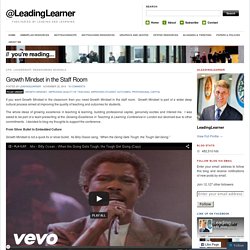

Harry Potter Transforms Class Dojo: Why Creativity Craves Constraints. After reading my students’ reflections on their blogging experience I felt like my assignment had taken multiple swigs of the Polyjuice Potion from Harry Potter.

If two or more people swallow some Polyjuice potion they can all look like the same person, even though they are not. Battle of The Seven Potters The reason why I was feeling that way was the sharp divide in the reaction to how I set up the blogging assignment. See every blog was supposed to in some way tie back to what we had learned in class, even if the student wanted to write about something that wasn’t class related. So when I read the following in their reflections: Student 1: “I loved the blogging assignment because of the freedom I had to write about anything I wanted to write about.” The Importance of a Healthy Teacher Ego. I have two primary messages for secondary school teacher training candidates.

If you don't love adolescents and don't have a healthy ego, you should seriously consider finding another profession. You'll be living with these kids for 6-8 hours every day, and if you don't love them, the days will be long and difficult. And if you don't have good ego strength (or if your ego is strong in a less-than-ideal way), you'll find it difficult to deal with a multitude of challenges. I want to focus here on the latter message.
There are very few professions in which success is usually less obvious. Here are some of the major challenges. Teacher Invisibility vs. Your Rubric Is a Hot Mess; Here’s How to Fix It. Share with Friends 28.1KShares.

5 Tips for a More Meaningful Rubric. Sarah Wike Loyola , Upper School Spanish Teacher, Spanish Team Leader, and Technology Mentor in Charlotte, NC Posted 06/08/2015 12:26PM | Last Commented 07/06/2015 2:30PM Every educator feels pretty darn cool the first few times they grade students' work.

What a powerful feeling it ignites in us, right? However, the reality of how much time we have to spend grading sets in quickly and the task becomes more and more monotonous. No teacher digs grading the same problems, essay prompts, responses, etc. over and over again, but it is a large part of what we do on a daily basis. Teachers Registration Board of South Australia. Targeted teaching: How to get the best from our schoolchildren. On a wintry Monday morning, Mrs Cereno explains to her Year 8 maths class how to use ratios to solve a problem about mixing cordial for a picnic.

Yet half her class is more interested in the pattern of raindrops on the window than her heroic efforts to reveal the hidden power of mathematics. She knows many of her students will flunk next week’s test. Some of them still haven’t grasped basic fractions and multiplication — primary school concepts. But she doesn’t have time to go back to the very beginning and teach it all over again. At the same time she’s worried about the handful of students who will ace the test. In schools across Australia, this scene is all too common. The huge spread of student achievement in the same year levels is one of the biggest challenges facing teachers and the school system. For many children, the spread means they fall further behind as they miss the building blocks needed for later years. When an orderly classroom is counterproductive. (iStock) It seems obvious to assume that teachers try to maintain control of their classrooms to create an environment where kids learn.

But, asks educator and writer Alfie Kohn, what if that isn’t always the case? Kohn (www.alfiekohn.org) takes an interesting look at the real purposes of classroom management in the following post. He is the author of 14 books, including “Schooling Beyond Measure….And Other Unorthdox Essays About Education,” just published by Heinemann. This post, which I am publishing with permission, appeared on his website. By Alfie Kohn Everyone knows why classroom management skills are considered a critical part of teacher training.
Growth Mindset in the Staff Room. If you want Growth Mindset in the classroom then you need Growth Mindset in the staff room.

Growth Mindset is part of a wider deep cultural process aimed at improving the quality of teaching and outcomes for students. The whole ideas of growing excellence in teaching & learning, building professional capital, genuinely excites and interest me. I was asked to be part of a team presenting at the Growing Excellence in Teaching & Learning Conference in London but declined due to other commitments.
I decided to blog my thoughts to support the conference. From Silver Bullet to Embedded Culture Growth Mindset is not a quick fix or silver bullet. I need to believe that I can improve and accept resilience, grit and hard work, over time, is required to become a better and in time a great teacher. When teachers are working within a whole school Growth Mindset culture, which is multi-faceted, they are far more likely to be successful in making marginal gains in teaching practice. Coe et al (2014) p.5.